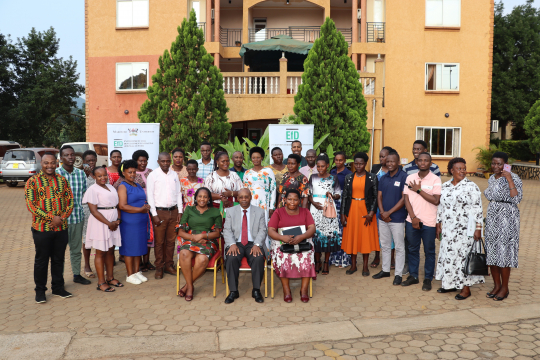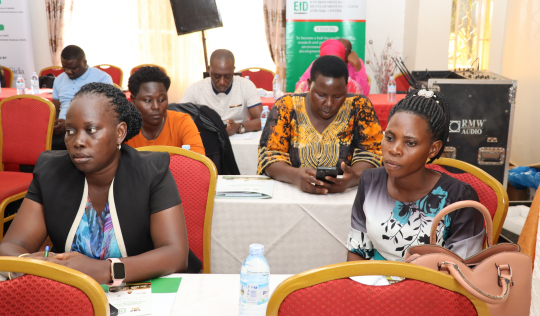Stakeholders from Hoima's local government, private sector, and civil society organizations have urged the government to expand access to clean energy sources like electricity and LPG to facilitate the country's transition from biomass and achieve its green growth strategy. Despite Uganda's capacity to generate and export electricity to neighboring countries, access and affordability remain significant challenges for rural areas and a large portion of the population.
During a policy dialogue hosted by EfD Uganda in Hoima, themed Energy Efficiency and Reduced Emissions in Uganda: Facts and Prospects, stakeholders highlighted the necessity of addressing these challenges. The event, part of the EfD Annual Meeting, gathered district local government officials, academia, youth, and members of the private sector and civil society organizations.
In his opening remarks, Johnny Mugisha, Deputy Director of the EfD-Mak Center, emphasized the importance of holding the dialogue in Hoima due to the region's developments in energy.
"The energy we are talking about includes firewood, charcoal, petroleum, electricity, and many others. We deliberately chose Hoima because of the energy developments here," Johnny Mugisha explained.
He noted the slow and long-term transition from biomass to cleaner energy sources, underscoring the need for discussions around biomass and clean energy.
Johnny Mugisha stressed the university's commitment to promoting energy dialogues across the country.
"We intend to get the root causes right from the grassroots communities so that together we can propose solutions to inform policymakers for decision-making and implementation," he said.
EfD Researcher John Sseruyange highlighted in his presentation Uganda's Path to Energy Efficiency and Reduced Emissions the critical role of energy efficiency and emission reduction in transforming Uganda from a peasant society to a modern, prosperous nation, as envisioned under Vision 2040. "Energy acts as a catalyst that drives all other sectors," stated John Sseruyange.
With agriculture contributing to 71.7% of employment, the mechanization of Uganda’s economy and the expanding transport sector are significantly increasing fossil fuel and biomass usage, leading to heightened carbon emissions and deforestation.
John Sseruyange warned of the dangers of biomass reliance, noting that Uganda’s forest cover has decreased from 24% in 1990 to 9% in 2015 due to tree cutting for firewood and charcoal.
"The rapid rate of forest depletion is alarming," he said, emphasizing the health and environmental impacts of biomass fuels, including air pollution and associated diseases. The presentation highlighted that women and children, especially girls, are disproportionately affected by biomass fuel collection, which hampers productive activities and schooling.
He pointed out that only 42% of the population had access to hydropower by 2021, and many clean energy systems, such as LPG, remain unaffordable for small businesses. He explained the complex interplay of institutions involved in promoting efficient energy systems, ranging from the Ministry of Energy and Mineral Development to international organizations like the World Bank. He stressed the importance of household and industrial capacity in adopting new technologies.
Despite these challenges, John Sseruyange outlined several promising initiatives aimed at enhancing energy efficiency and reducing emissions. Vision 2040 focuses on upgrading industrial technologies to less energy-consuming alternatives. The National Development Plans aim to increase clean energy accessibility and promote efficient cooking technologies. The Uganda Green Growth Development Strategy emphasizes low-carbon development and solar energy installation. Additionally, Uganda’s hydropower capacity has increased from 1,278.6 MW in 2019/20 to 1,370.8 MW in 2021/22, demonstrating improved energy generation capacity. Solar energy expansion efforts have resulted in off-grid solar installations reaching 30,000 households, with several solar PV plants contributing over 65 MW. The Clean Cooking Supply Chain Expansion Project has sold 72,535 energy-saving stoves by 2020. Furthermore, the government is aiming to distribute 1 million subsidized LPG cylinders to promote cleaner cooking technologies.
John Sseruyange also highlighted the establishment of Kiira Motors to produce electric vehicles and the development of highways and non-motorized transport systems to reduce urban traffic congestion and emissions.
"The government is taking significant steps towards a sustainable energy future," he concluded.
John Sseruyange called for policy and regulatory reforms, public awareness campaigns, and rigorous assessments to promote energy transitions.
Education and awareness are key factors
During the plenary discussions, several interventions were proposed to enhance the transition to green technologies. Highlighting the negative environmental impacts of high school dropout rates, participants noted that many youths turn to activities like bricklaying, charcoal burning, and sand mining for survival, which harms the environment. They called for public education and awareness programs to address fears and cultural biases against new energy technologies.
The affordability of new energy sources was another major concern, with high initial costs and refilling expenses for LPGs making them inaccessible for many rural poor.
Participants also highlighted the problem of low-quality counterfeits sabotaging payment schemes for acquiring new technologies, calling for regulation to address quality standards.
Cultural perceptions that clean cooking energies are for the rich and lazy further hinder the transition, underscoring the need for continuous public sensitization, which they stressed should be physical. Limited budgets for local governments and weak enforcement mechanisms were also cited as barriers to implementing clean energy programs. Participants proposed subsidies for manufacturers and consumers of clean energy sources, expanding access to electricity and LPG in rural areas, and ensuring widespread availability and awareness of green technologies.
Hoima district leader decries effects of indoor pollution
The Vice Chairperson of Hoima District, Hellen Namulumba, raised concerns about the severe effects of indoor pollution on the community's health. She noted that many lives have been lost due to ignorance about the dangers of indoor pollution.
“There is no single woman in the village who would wish to continue cooking on firewood but they are incapacitated. They can adopt other energy sources like electric and gas cookers,” she stressed.
Hellen Namulumba highlighted the increasing cases of cancer associated with the use of biomass. She called for government intervention to reduce indoor pollution by extending power coverage to rural areas beyond 50%, reducing power unit costs for domestic users, and ensuring consistent power supply.
She also emphasized the need to support small-scale innovators, such as those manufacturing briquettes and improved cooking stoves, to reduce indoor pollution. Additionally, she called for strengthened policies for emission control systems in automobiles to reduce cancer and other disease rates.
“If at all government can boost small-scale innovators like assisting briquette manufacturers in marketing their products through sensitization, boost those making improved cooking stoves, we can reduce indoor pollution," she said. "And if government can strengthen policies for emission control systems in automobiles that can greatly make an impact in reducing the rate of people dying of cancers and other diseases," she proposed.
By: Jane Anyango






